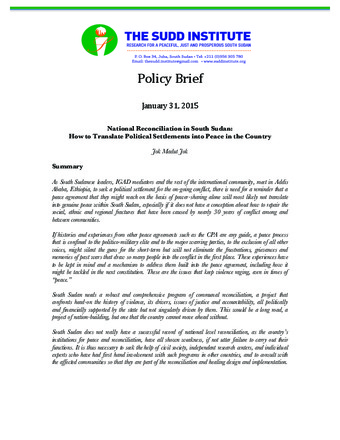National Reconciliation in South Sudan: How to Translate Political Settlements into Peace in the Country
Publication Summary
As South Sudanese leaders, IGAD mediators and the rest of the international community, meet in Addis Ababa, Ethiopia, to seek a political settlement for the on-going conflict, there is need for a reminder that a peace agreement that they might reach on the basis of power-sharing alone will most likely not translate into genuine peace within South Sudan, especially if it does not have a conception about how to repair the social, ethnic and regional fractures that have been caused by nearly 30 years of conflict among and between communities.
If histories and experiences from other peace agreements such as the CPA are any guide, a peace process that is confined to the politico-military elite and to the major warring parties, to the exclusion of all other voices, might silent the guns for the short-term but will not eliminate the frustrations, grievances and memories of past wars that drew so many people into the conflict in the first place. These experiences have to be kept in mind and a mechanism to address them built into the peace agreement, including how it might be tackled in the next constitution. These are the issues that keep violence raging, even in times of “peace.”
South Sudan needs a robust and comprehensive program of communal reconciliation, a project that confronts head-on the history of violence, its drivers, issues of justice and accountability, all politically and financially supported by the state but not singularly driven by them. This would be a long road, a project of nation-building, but one that the country cannot move ahead without.
South Sudan does not really have a successful record of national level reconciliation, as the country’s institutions for peace and reconciliation, have all shown weakness, if not utter failure to carry out their functions. It is thus necessary to seek the help of civil society, independent research centers, and individual experts who have had first hand involvement with such programs in other countries, and to consult with the affected communities so that they are part of the reconciliation and healing design and implementation.
Jok Madut Jok is trained in the anthropology of health and holds a Ph.D. from the University of California, Los Angeles (UCLA). He is a fellow of Rift Valley Institute and Director of the Sudd Institute. Jok has held fellowship positions at a number of other institutions, including the United States Institute of Peace and the Woodrow Wilson International Center for Scholars. He also served in the Government of South Sudan as undersecretary in the Ministry of Culture and Heritage for three years. He has also worked in aid and development and author of four books and numerous articles covering gender, sexuality and reproductive health, humanitarian aid, ethnography of political violence, gender-based violence, war and slavery, and the politics of identity in South Sudan and Sudan. His book Breaking Sudan: The Search for Peace, was published in 2017 by OneWorld.

